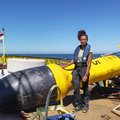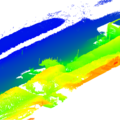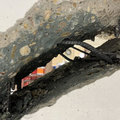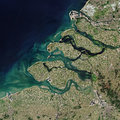Archive
11 September 2023
successful participation of HE department at the ESREL conference 2023.

The HE department had a successful participation at the European Safety and Reliability Association conference ESREL 2023. Leslie Mooyart, Gina Torres, Miguel Mendoza, Guus Rongen, Rieke Santjer, and myself (on behalf of Patricia Mares) presented papers at the conference.
19 June 2023
Damping waves with 50,000 rubber grass blades

Dimitris Dermentzoglou, PhD student in Coastal Engineering, investigates whether salt marshes can serve as a natural solution for coastal protection. It is why he mimics salt marsh vegetation at the TU Delft Waterlab. He hopes his research will yield a more sustainable alternative to the repeated raising of dikes.
25 May 2023
Drought as the perfect storm for salt intrusion research

River water is becoming saltier and that is not good news for our drinking water. To find solutions, researchers are working hard to understand when and how salt intrusion happens. Hydraulic engineering PhD candidate Tess Wegman is fascinated by the behaviour of saltwater and freshwater flows taking place beneath the surface of the water.
06 April 2023
Coastal changes not only caused by wind and waves, but also by people

Our coast protects us from the water; it is necessary understand its dynamic processes and to retain the sand at the coast. Natural influences such as wind and waves are constantly changing the coastline. Another important process affecting the coastline is often overlooked: human activity. To investigate this, Roderik Lindenbergh of TU Delft receives a grant from the NWO's Open Technology Programme for the AdaptCoast project.
13 March 2023
Dutch bridges are stronger than assumed

Most concrete bridges on our highways have been there for more than sixty years. They tirelessly carry heavily loaded trucks. How long can we still rely on these bridges? Yuguang Yang and his colleagues made precise replicas of existing bridge parts. Last week in the lab at TU Delft, they loaded one of the replicas till collapsing: how many trucks can the bridge ultimately carry? The first impression from the tests turned out to be positive; the experiments suggest that the bridges may be stronger than initially thought. Some of bridges can hopefully last a while and do not need to be strengthened or replaced yet.
24 February 2023
16 million to keep the Dutch delta livable - even as it changes

Deltas and coastal plains are attractive places to live: fertile, flat, and open to the sea. These lowlands are, however, also vulnerable to climate change and sea-level rise. To better predict how deltas develop in the future, a thorough understanding is needed of biogeomorphology- how organisms, currents, waves, water, and sand discharge shape the delta-landscape. It was announced today that Δ-ENIGMA, a project focusing on this formation of the delta landscape, is one of the projects that will be funded from the National Roadmap for Large-Scale Research Infrastructure (LSRI) call of the Dutch Research Counsil (NWO).
21 November 2022
Refreeze the Arctic Foundation supports climate research at TU Delft

On 21 November 2022, Delft University Fund signed a multi-year grant agreement with the Refreeze the Arctic Foundation. This will enable the development of innovative methods at TU Delft to modify clouds to combat global warming.
17 November 2022
Roderik Lindenbergh & Mieke Kuschnerus laser scan data set of Kijkduin

Nature Portfolio’s Scientific Data Journal published an article written by Sander Vos, Katharina Anders, Mieke Kuschnerus, Roderik Lindenbergh, Bernhard Höfle, Stefan Aarninkhof and Sierd de Vries, that describes a 6 month long hourly laser scan survey of the beach-dune system at Kijkduin, The Netherlands. The Netherlands is protected by about 250 kilometers of natural beach-dune systems and understanding the natural variability and resilience is of key importance to protect the Netherlands with the future climate change and sea level rise. The dataset provides information about storm responses and shoreward sand transport which is important for the resilience determination.
01 November 2022
A 100 million euro investment to make TU Delft Campus more sustainable

TU Delft is going to invest substantially in making its campus more sustainable. TU Delft is thus putting its previously published Sustainable TU Delft - vision, ambition & action plan into practice. Over the next few years, TU Delft will work towards a CO2-neutral, circular and climate-adaptive campus, with a focus on improving biodiversity and quality of life.
27 September 2022
Keeping our feet dry with the help of technology, nature and people

The floods that hit Limburg in 2021 showed that despite a raft of measures the Netherlands remains at risk from rising water. Professor of Hydraulic Engineering Bas Jonkman carries out flood risk assessments in this country and abroad and tries to come up with solutions which, apart from dams and dykes, also involve nature and people.